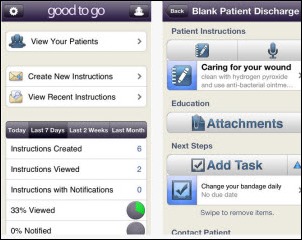Giving a patient medications in the ER, having them pop positive on a test, and then withholding further medications because…
Patient Report: Good to Go for Discharge Instructions
The PR folks working with Good to Go from ExperiaHealth (part of Vocera) offered to let me speak to an actual patient user who has used the company’s solution. Hospital nurses use Good to Go’s technology to record their discharge instructions as they are discussed with the patient. The patient, family, and caregivers can review the session recording at any time on a smartphone, iPad, desktop PC, or telephone.
ExperiaHealth, whose tagline is “Humanizing the Healthcare Experience,” says the technology improves the patient experience and reduces readmissions, citing a CDC report that found that 90 percent of adults can’t follow the medical instructions they are given because they can’t understand them or don’t remember them. Good to Go won the “Care About Your Care” award from the Robert Wood Johnson Foundation this year.
I spoke to Mrs. Beverly Sturm, a 69-year-old widow who lives alone in Cullman, AL. She was recently discharged from Cullman Regional Medical Center after being treated for diabetes.
According to Mrs. Sturm, “We all need an advocate. It’s difficult to remember everything they’re telling you when your being discharged. Sometimes you don’t have time to read the paperwork immediately. It’s helpful to my daughter, who was giving me care at home, to be able to hear the discharge information first hand. I thought it was a pleasant experience and helpful.”
Mrs. Sturm’s daughter wasn’t able to be present during the discharge session with the nurse since she was bringing the car around to take her home. Mrs. Sturm says it would have been hard for her to remember on her own. “When you get home, besides having to go by the drugstore and get your medicine and read the paperwork, you’re tired and want to lie down and rest. It was extremely helpful.”
I asked her what kinds of things the recording helped her remember or understand. “I had a couple of changes of medication,” she said. “That’s one thing I needed to listen to again. I had one or two things that were eliminated and something new started, how to take it and when to take it. Then, too, when I was supposed to be back in and contact my doctor in the office. The medicine was the most important thing. I’m diabetic and I have to be careful of the information I get and what I have to change with my diet, the medicine, and the units of insulin. I could hear it while it was quiet and had my undivided attention.”
I asked Mrs. Sturm if having the information made her healthier. “Oh, yes. I’m certain at least being able to go over it again verifies my memory.”



Like this service how much is it